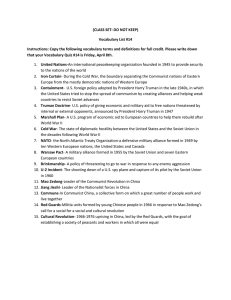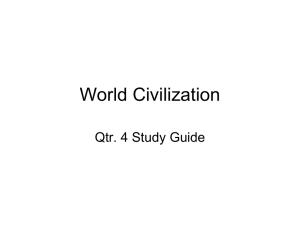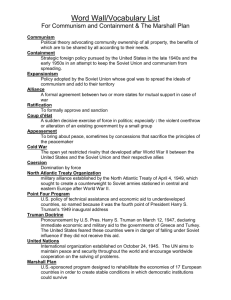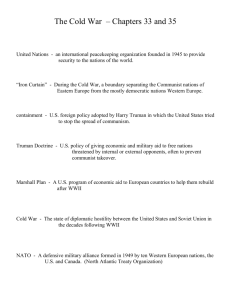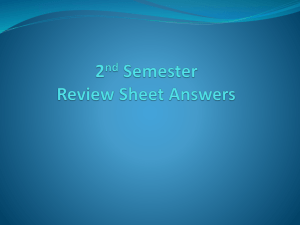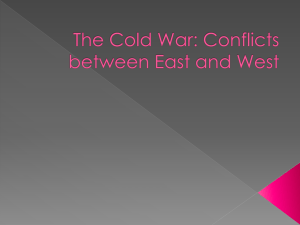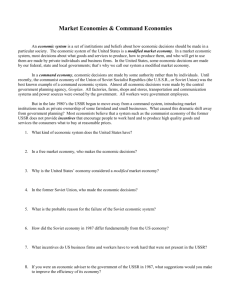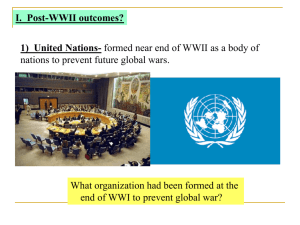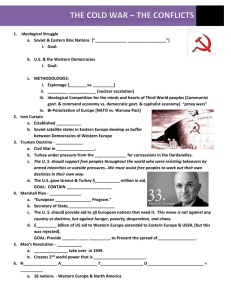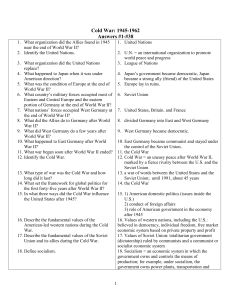Review 15
advertisement
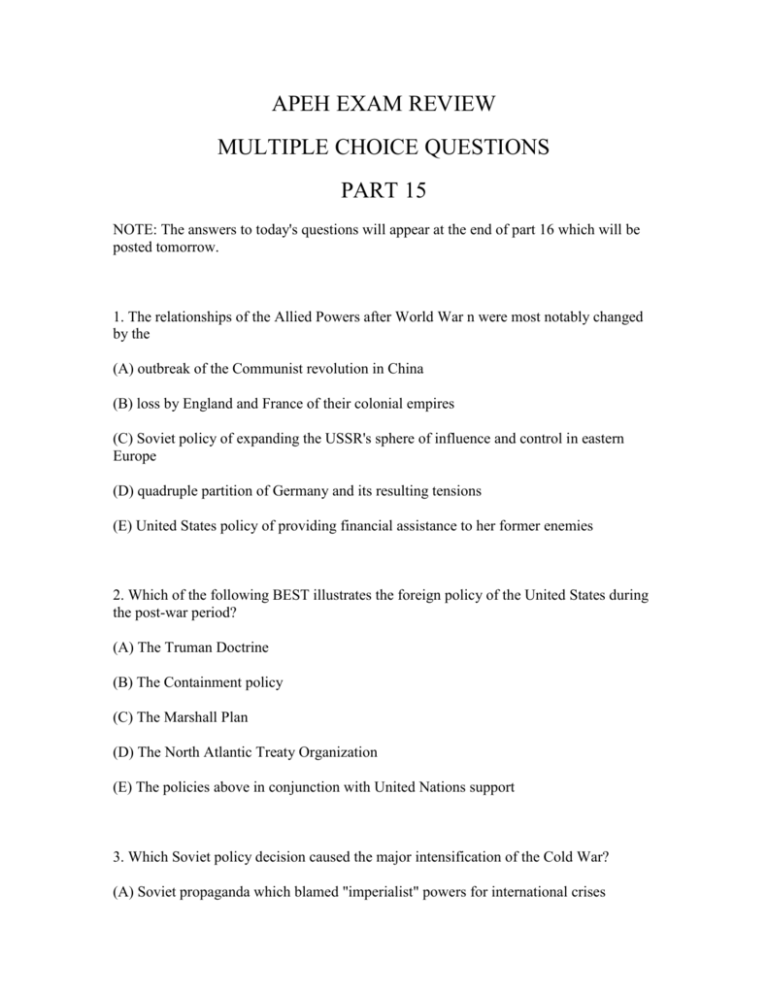
APEH EXAM REVIEW MULTIPLE CHOICE QUESTIONS PART 15 NOTE: The answers to today's questions will appear at the end of part 16 which will be posted tomorrow. 1. The relationships of the Allied Powers after World War n were most notably changed by the (A) outbreak of the Communist revolution in China (B) loss by England and France of their colonial empires (C) Soviet policy of expanding the USSR's sphere of influence and control in eastern Europe (D) quadruple partition of Germany and its resulting tensions (E) United States policy of providing financial assistance to her former enemies 2. Which of the following BEST illustrates the foreign policy of the United States during the post-war period? (A) The Truman Doctrine (B) The Containment policy (C) The Marshall Plan (D) The North Atlantic Treaty Organization (E) The policies above in conjunction with United Nations support 3. Which Soviet policy decision caused the major intensification of the Cold War? (A) Soviet propaganda which blamed "imperialist" powers for international crises (B) Soviet establishment of "people's republics" in Eastern Europe contrary to the Yalta agreements (C) Soviet mistrust of capitalism leading to a complete break in diplomatic relations with the U.S. (D) Soviet refusal to repay obligations under the Lend-Lease agreement (E) Soviet espionage in the West, leading to the development of the USSR's own nuclear arsenal 4. The primary purpose of the Truman Doctrine involved (A) the offer of substantial economic aid to the democracies of Europe (B) providing military, economic, and social programs to democratic governments fighting communism (C) placing controls on access to nuclear weapons (D) aiding underdeveloped nations in Latin America (E) utilizing the CIA to foment revolution in communist nations 5. "A shadow has fallen upon the scenes so lately lighted by the Allied victory. Nobody knows what Soviet Russia and its communist intemational organization intend to do in the immediate future ... From Stettin in the Baltic to Trieste in the Adriatic, an iron curtain has descended across the continent." Westminister College Fulton, MO. March 5, 1946. The author of this speech is which of the following? (A) Harry S. Truman (B) Dwight D. Eisenhower (C) Douglas MacArthur (D) Winston Churchill (E) George C. Marshall 6. The FIRST nation given direct assistance by the United States in its attempt to combat communist insurgency was (A) Italy (B) The Philippines (C) Greece (D) Yugoslavia (E) Germany 7. Which of the following Eastem European nations successfully rejected control over its communist party by Moscow? (A) Poland (B) Hungary (C) Yugoslavia (D) Czechoslovakia (E) Rumania 8. A major failure of the United Nations in the post-war period was (A) its inability to stop the proliferation of nuclear weapons (B) its failure to forsee the hostility developing between the U.S. and U.S.S.R. (C) the limits placed upon the power of the secretary-general (D) its lack of success in mediation within crises situations (E) its lack of power to enforce peace-keeping decisions among permanent Security Council members 9. Which of the following United Nations agencies has the greatest role within international relations? (A) The Security Council (B) The Food and Agriculture Organization (C) The General Assembly (D) The World Health Organization (E) The Economic and Social Council 10. West Germany's economic recovery in the 1950's was based upon its embrace of (A) communism (B) socialism (C) a mixed economy (D) welfare statism (E) free market capitalisrl. 11. France in the post-war period was marked by the obstinate leadership of (A) Jean Monnet (B) Charles De Gaulle (C) Giscard D'Estang (D) Georges Pompideau (E) Claude Monet 12. In 1957, the Treaty of Rome provided for the establishment of the (A) North Atlantic Treaty Organization (B) Council of Europe (C) European Economic Community (D) European Coal and Steel Community (E) Marshall Plan 13. The Soviet Union's attempt to expand its sphere of influence in the 1960's was demonstrated by all of the following EXCEPT (A) the Cuban Missile Crisis of 1962 (B) the Six Day War of 1967 (C) the"Prague Spring" of 1968 (D) the principle of "peaceful coexistence" (E) the Berlin Wall 14. Which post-war leader is incorrectly paired with the country he led? (A) Tito and Italy (B) DeGaulle and France (C) Adenauer and West Germany (D) Khrushchev and the U.S.S.R. (E) Macmillan and England 15. Attempts to lessen tensions between the U.S. and U.S.S.R. in the 1970's were based upon the concept of (A) detente (B) "more than one road to socialism" (C) the Brezhnev Doctrine (D) "peaceful coexistence" (E) linkage 16. The decolonization process in sub-Saharan Africa was LEAST violent in which of the following former colonies? (A) The Congo (B) Rhodesia (C) Kenya (D) Nigeria (E) Angola 17. Hostility between Arabs and Jews in the nation of Israel was exacerbated by which of the following? (A) Britain's inability to maintain order during the Mandate period (B) Increased Jewish demands for a homeland after the Holocaust (C) Arab resistance to Jewish immigration after 1933 (D) Inability of Arabs and Jews to compromise their political and religious ideologies (E) The factors listed above 18. American involvement in Vietnam is best categorized as the result of (A) French defeats at Bien Dien Phu (B) The Gulf of Tonkin incident (C) Ho Chi Minh's radical communism (D) Political decisions spanning a twenty year period (E) President Lyndon Johnson's policies Part 14 1-E, 2-D, 3-E, 4-C, 5-E, 6-E, 7-D, 8-B, 9-B, 10-E, 11-E, 12-C, 13-E, 14-B, 15-C
